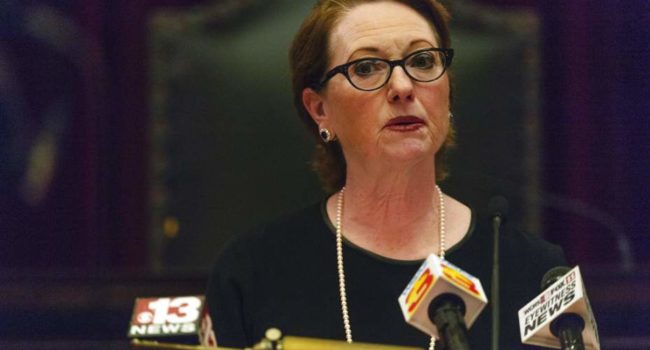CHARLESTON — Retired Supreme Court Justice Robin Davis has filed a motion to officially be considered part of Justice Margaret Workman’s case that halted her impeachment in the state Senate.
For that reason and a couple of others, the presiding judge of the impeachment trials issued an order this afternoon that Davis’s impeachment trial will be put off indefinitely.
“It is hereby ORDERED that the trial of Respondent Davis is continued generally,” wrote Paul Farrell, the presiding judge of the impeachment trials in the Senate.
Farrell was responding to factors that included Davis’s decision to change her legal team, as well as the large amount of motions and discovery required to prepare for impeachment trial.
Farrell was also reacting to Davis’s request to have her impeachment trial officially affected by last week’s ruling that halted Workman’s trial, which was supposed to begin today.
An acting Supreme Court blocked the impeachment trial for Workman in part on procedural grounds.
“Retired Justice Robin J. Davis was impeached following the same procedure and on most of the same grounds returned against Justice Workman,” stated Davis’s motion, which was filed Friday.
“Furthermore; the same separation of powers; due process; and procedural laws identified by the Court in the Workman decision are applicable to and controlling in the pending impeachment trial of retired Justice Davis.”
The impeachment trial for Davis was scheduled to begin Oct. 29.
“Retired Justice Robin J. Davis respectfully moves the Court to expand the writ issued in the Workman decision to prohibit the impeachment trial of Retired Justice Davis,” wrote lawyers for Davis.
Davis announced her retirement August 14, the day after West Virginia’s House of Delegates passed 11 articles of impeachment naming the remaining members of the Supreme Court.
At the time, she blasted the impeachment process and said her retirement is the only way voters could have a say on who fills the seat.
“What we are witnessing is a disaster for the rule of law, the foundation of our state, and indeed, our very society,” Davis stated.
“For when a legislative body attempts to dismantle a separate branch of government, the immediate effects, as well as the precedent it sets for the future, can only be termed disastrous.”
Earlier this month, during a pretrial hearing in the Senate, a majority of senators voted down a motion that would have dismissed Davis from impeachment trial. The motion was rejected on a 15-19 vote. The vote was not along party lines.
Davis has already removed herself from office, but continuing with an impeachment trial could prevent her from running for public office again and, possibly, from collecting her state pension.
Davis has filed a federal lawsuit over the continued impeachment.
Meanwhile, Chief Justice Workman filed a motion with the very Supreme Court where she serves, attempting to halt her impeachment trial.
An acting Supreme Court on Thursday ruled in Workman’s favor on constitutional and procedural grounds.
An aspect of the ruling suggested the House had not gone through proper procedures for the impeachment process by not including findings of fact in the articles and failing to pass a full resolution adopting the articles.
A separate opinion by acting justices Duke Bloom and Jacob Reger suggested the acting Supreme Court should not even have weighed in on those matters.
“It is clear that when the majority opinion resolved the substantive issues in Article IV, Article VI and Article XIV, the petitioner had obtained the relief she sought,” the two judges wrote. “Thus, there was no need to address the remaining issues raised.”
Bloom and Reger suggested that aspect of the broader ruling could also halt the impeachment trials for justices Davis and Allen Loughry, who was found guilty last week of 11 federal counts.
“More importantly, the advisory opinion on the two issues has a lethal consequence — it has invalidated the impeachment trials of the two remaining judicial officers,” Bloom and Reger wrote.
House Speaker Roger Hanshaw, R-Clay, said the House should have authority to govern its own proceedings.
“The House has done that, and we have followed our procedures as they are intended to be followed,” Hanshaw said today.




